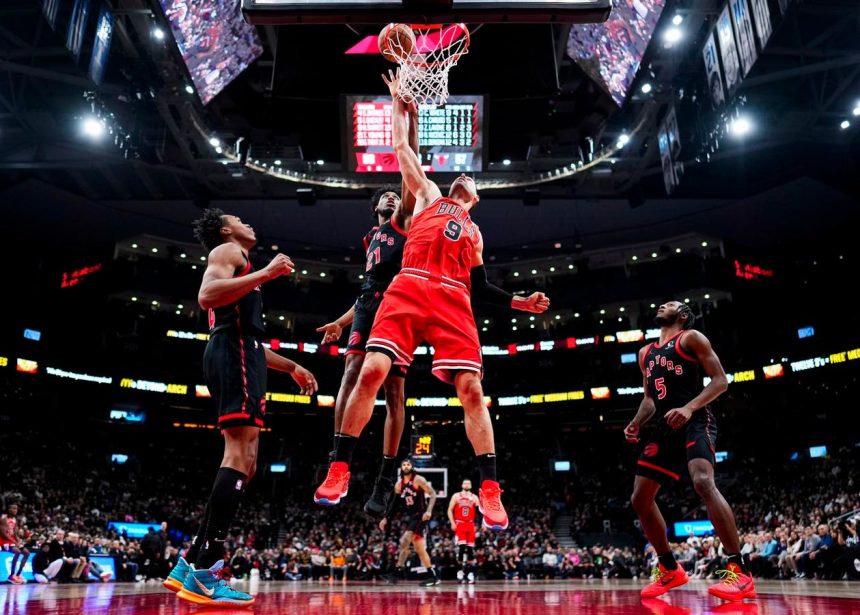Nikola Vučević’s Resurgence: A Statistical and Strategic Analysis
Nikola Vučević, the Chicago Bulls’ center, is experiencing a remarkable resurgence this season, showcasing All-Star caliber performance after years of fluctuating shooting efficiency. His statistical output has significantly improved, averaging 21.3 points, 9.8 rebounds, and 3.3 assists per game. Most notably, his shooting percentages have skyrocketed, with a field goal percentage of 58.7% compared to 48.4% last season, and a stunning three-point percentage of 47.4%, up from a mere 29.4%. This isn’t simply a matter of selective shot-taking; Vučević’s three-point attempt rate has actually increased from 25.8% of his total shots last season to 32.7% this year, encouraged by head coach Billy Donovan’s strategic emphasis on long-range shooting from the center position.
This dramatic improvement in Vučević’s performance carries significant implications for the Bulls, particularly regarding his trade value. Previously perceived as overpaid based on his prior performance, his current production arguably positions him as underpaid, albeit with the caveat of a relatively small sample size of 24 games. This presents a unique opportunity for the Bulls to potentially recoup some of the value lost in the 2021 trade that brought Vučević to Chicago. The initial trade, which sent Wendell Carter Jr., Franz Wagner, and the rights to Jett Howard to the Orlando Magic, was widely viewed as an overpay by the Bulls. Vučević’s current form, however, makes him a much more attractive trade asset.
His current contract, valued at $20 million, is manageable for several teams looking to bolster their center position. Furthermore, the Bulls’ comfortable position under the luxury tax threshold, with over $4.5 million in buffer, allows them to engage in trades with teams exceeding the salary cap and even those above the first and second aprons, as long as they are willing to absorb additional salary. This flexibility, coupled with Vučević’s elevated performance, puts the Bulls in a strong negotiating position.
A potential trade involving Vučević could signify a decisive shift towards a full rebuild, a move that the Bulls’ fanbase has been advocating for over the past three years. While the team’s current trajectory and intentions remain to be seen, the upcoming trade deadline presents a crucial decision point. The Bulls have the leverage to capitalize on Vučević’s resurgent performance and initiate a rebuild, should they choose to do so.
Analyzing the Variables in Potential Vučević Trades
The potential return for Vučević hinges on several factors. The first is the sustainability of his current performance level. While his improved shooting percentages and increased scoring output are impressive, maintaining this level of play throughout the season will significantly impact his trade value. A regression towards his previous performance levels could dampen interest from potential suitors and reduce the assets the Bulls could receive in return.
The second factor is the market demand for a center with Vučević’s skillset. While his improved three-point shooting adds a valuable dimension to his offensive game, several teams already have established centers or are prioritizing other positions. The level of competition for his services will dictate the bargaining power of the Bulls. A high demand scenario could lead to a bidding war, benefiting the Bulls significantly. Conversely, limited interest could restrict their options and lower the potential return.
The Bulls’ own internal evaluation of their roster and future direction is the third crucial element. If they believe they can contend for a playoff spot or make a deep run with Vučević as a key contributor, they might opt to retain him. However, if they prioritize a long-term rebuild, trading him for younger players or draft picks becomes a more strategic move.
The Potential Benefits of Trading Vučević
Trading Vučević offers several potential benefits for the Bulls. First and foremost, it allows them to recoup some of the value lost in the original trade. Acquiring young talent or draft picks could accelerate their rebuilding process and lay the foundation for future success. Moreover, shedding Vučević’s salary opens up cap space for future free agency pursuits, allowing the Bulls to target players who better fit their long-term vision.
Secondly, trading Vučević creates an opportunity to give more playing time to younger players on the roster, allowing them to develop and gain valuable experience. This could be especially beneficial for Patrick Williams, who could see an increase in minutes and offensive opportunities. Investing in the development of young talent is essential for any rebuilding team, and trading Vučević could facilitate this process.
Finally, a trade involving Vučević could signal a clear commitment to a full rebuild, satisfying the demands of a fanbase eager for a change in direction. This could generate renewed enthusiasm and optimism among fans, creating a more positive atmosphere around the team.
The Potential Drawbacks of Trading Vučević
While trading Vučević presents several potential upsides, there are also potential drawbacks to consider. Losing Vučević means losing a valuable veteran presence and a skilled offensive player. His ability to stretch the floor with his improved three-point shooting creates spacing for his teammates and adds a dimension to the Bulls’ offense. Replacing his production and veteran leadership could prove challenging.
Furthermore, if Vučević’s performance regresses after a potential trade, the acquiring team might feel they overpaid, potentially damaging the Bulls’ reputation in future trade negotiations. It’s crucial for the Bulls to accurately assess Vučević’s long-term value and negotiate a fair deal that benefits both teams involved.
Conclusion: A Strategic Crossroads for the Bulls
The resurgence of Nikola Vučević presents the Chicago Bulls with a significant strategic decision. His improved performance has increased his trade value, offering the opportunity to recoup assets, initiate a rebuild, and invest in young talent. However, trading him also entails the risk of losing a valuable contributor and potentially overselling his long-term value. The upcoming trade deadline will be a crucial juncture for the Bulls, forcing them to carefully weigh the potential benefits and drawbacks of trading their resurgent center. Their decision will significantly impact the franchise’s direction in the short and long term.



